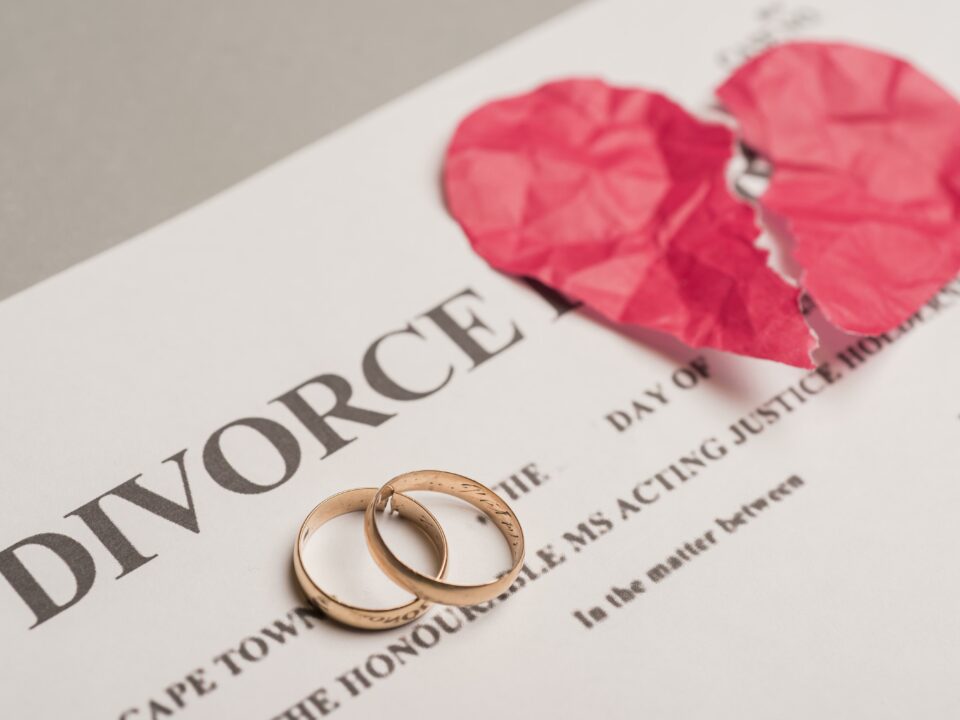Managing Emotions During Divorce

Divorce is a life-changing event that can trigger a rollercoaster of emotions. As you navigate the divorce process, it's important to be aware of the common emotional stages you may experience. This knowledge can help you better understand and manage your feelings during this challenging time.
The emotional journey of divorce often follows a pattern, though the timeline and intensity of each stage may vary from person to person. Recognising these stages can provide a sense of normalcy and reassurance as you work through the dissolution of your marriage. In this article we'll explore ways you can manage your emotions during the divorce process.

Understanding the Common Emotional Stages of Divorce
The key emotional stages of divorce include:
Denial and Shock: When the reality of the situation first sets in, you may feel a sense of disbelief and struggle to accept that your marriage is ending.
Anger and Resentment: It's common to feel anger after divorce towards your ex-spouse, the divorce process, or even yourself during this time.
Bargaining and Guilt: You may find yourself trying to negotiate or make compromises in an effort to save the marriage, accompanied by feelings of guilt.
Depression and Sadness: Grieving the loss of your marriage and the dreams you had for the future is a natural part of the process.
Acceptance and Moving Forward: Over time, you'll begin to accept the new reality and focus on rebuilding your life.
Understanding these stages can help you recognize your emotions as a normal part of the divorce journey. Remember to be patient and compassionate with yourself as you navigate this challenging transition.
Dealing with Feelings of Grief, Loss, and Uncertainty
Going through a divorce can be an incredibly difficult and emotional experience. It's common to feel a deep sense of grief after divorce, loss, and uncertainty as you navigate this major life transition. Grieving the end of your marriage is a natural response. You may mourn the loss of the relationship, shared dreams, and the life you once had. These feelings of grief can come in waves and it's important to allow yourself to process them. In addition to grieving, you may also feel a profound sense of uncertainty about the future. What will your life look like post-divorce? How will you adjust to being single again? These questions can be unsettling, but know that it's normal to feel this way. Remember to be patient and compassionate with yourself during this time. Seek out emotional support from friends, family, or a therapist who can provide a safe space to work through your feelings. With time and self-care, you can get through this challenging period and begin to rebuild your life.Managing Anger, Resentment, and Bitterness in a Divorce
Divorce can trigger a whirlwind of emotions, with anger after divorce, resentment, and bitterness often taking center stage. Understanding and managing these feelings is crucial for your emotional health and overall well-being.
Recognize and Acknowledge Your Emotions
The first step in managing anger, resentment, and bitterness is recognizing and acknowledging these emotions. Denying or suppressing them can lead to further emotional turmoil and hinder your ability to heal. Give yourself permission to feel these emotions without judgment.
Practice Mindfulness and Emotional Regulation
Mindfulness practices such as meditation, deep breathing exercises, and yoga can help you stay grounded and present, reducing the intensity of negative emotions. Emotional regulation techniques, such as journaling or talking to a trusted friend, can also help process and release these feelings.
Seek Professional Support
Consider seeking the help of a therapist or counselor who specializes in divorce or family issues. Professional support can provide you with strategies to cope with your emotions, offer a safe space to express yourself, and help you navigate through this challenging time.
Focus on Constructive Communication
If you need to communicate with your ex-partner, strive to keep interactions as constructive and respectful as possible. Avoiding blame and focusing on clear, calm communication can reduce conflict and help manage anger and resentment.
Engage in Physical Activity
Exercise is a powerful tool for managing anger and reducing stress. Activities such as running, swimming, or even walking can release endorphins, improve your mood, and provide a healthy outlet for negative emotions.
The first step in managing anger, resentment, and bitterness is recognizing and acknowledging these emotions. Denying or suppressing them can lead to further emotional turmoil and hinder your ability to heal. Give yourself permission to feel these emotions without judgment.
Practice Mindfulness and Emotional Regulation
Mindfulness practices such as meditation, deep breathing exercises, and yoga can help you stay grounded and present, reducing the intensity of negative emotions. Emotional regulation techniques, such as journaling or talking to a trusted friend, can also help process and release these feelings.
Seek Professional Support
Consider seeking the help of a therapist or counselor who specializes in divorce or family issues. Professional support can provide you with strategies to cope with your emotions, offer a safe space to express yourself, and help you navigate through this challenging time.
Focus on Constructive Communication
If you need to communicate with your ex-partner, strive to keep interactions as constructive and respectful as possible. Avoiding blame and focusing on clear, calm communication can reduce conflict and help manage anger and resentment.
Engage in Physical Activity
Exercise is a powerful tool for managing anger and reducing stress. Activities such as running, swimming, or even walking can release endorphins, improve your mood, and provide a healthy outlet for negative emotions.
Rebuilding Self-Esteem and Confidence Post-Divorce
Divorce can leave a significant dent in your self-esteem and confidence. Rebuilding these aspects of yourself is essential for moving forward and creating a fulfilling life post-divorce.Reflect on Your Strengths and Achievements
Take time to reflect on your personal strengths and past achievements. Recognizing your capabilities and what you've accomplished can help rebuild your confidence and remind you of your worth.
Set Realistic Goals
Setting and achieving small, realistic goals can provide a sense of accomplishment and boost your self-esteem. Whether it's related to your career, hobbies, or personal development, each success will reinforce your ability to move forward.
Surround Yourself with Positive Support
Surround yourself with friends and family who uplift and support you. Positive social interactions can reinforce your self-worth and provide encouragement as you navigate this new chapter of your life.
Take time to reflect on your personal strengths and past achievements. Recognizing your capabilities and what you've accomplished can help rebuild your confidence and remind you of your worth.
Set Realistic Goals
Setting and achieving small, realistic goals can provide a sense of accomplishment and boost your self-esteem. Whether it's related to your career, hobbies, or personal development, each success will reinforce your ability to move forward.
Surround Yourself with Positive Support
Surround yourself with friends and family who uplift and support you. Positive social interactions can reinforce your self-worth and provide encouragement as you navigate this new chapter of your life.
Invest in Self-Improvement
Consider pursuing new hobbies, taking up classes, or engaging in activities that interest you. Investing in yourself and discovering new passions can reignite your sense of purpose and confidence.
Consider pursuing new hobbies, taking up classes, or engaging in activities that interest you. Investing in yourself and discovering new passions can reignite your sense of purpose and confidence.

Practice Self-Compassion
Be kind to yourself during this transition. Understand that it's okay to feel vulnerable and that rebuilding self-esteem takes time. Practice self-compassion by treating yourself with the same kindness and understanding you would offer a friend.
Be kind to yourself during this transition. Understand that it's okay to feel vulnerable and that rebuilding self-esteem takes time. Practice self-compassion by treating yourself with the same kindness and understanding you would offer a friend.
Prioritising Self-Care and Wellbeing During the Divorce Process
Divorce can be a stressful and emotionally draining experience, making self-care and well-being more important than ever.Develop a Self-Care Routine
Create a self-care routine that includes activities you enjoy and that help you relax. This could include reading, taking baths, practicing mindfulness, or engaging in a favorite hobby. Regularly scheduling time for self-care can help reduce stress and improve your overall well-being.
Create a self-care routine that includes activities you enjoy and that help you relax. This could include reading, taking baths, practicing mindfulness, or engaging in a favorite hobby. Regularly scheduling time for self-care can help reduce stress and improve your overall well-being.

Maintain a Healthy Lifestyle
Pay attention to your physical health by eating nutritious meals, getting regular exercise, and ensuring you get enough sleep. A healthy body supports a healthy mind and can help you cope better with the emotional strain of divorce.
Seek Out Support Services
Utilize divorce support services such as support groups, counseling, or coaching. These resources can provide emotional support, practical advice, and a sense of community during this challenging time.
Manage Stress with Healthy Coping Mechanisms
Identify healthy ways to manage stress, such as practicing relaxation techniques, engaging in physical activity, or pursuing creative outlets. Avoid unhealthy coping mechanisms like excessive drinking or isolating yourself, as these can exacerbate stress and hinder your recovery.
Pay attention to your physical health by eating nutritious meals, getting regular exercise, and ensuring you get enough sleep. A healthy body supports a healthy mind and can help you cope better with the emotional strain of divorce.
Seek Out Support Services
Utilize divorce support services such as support groups, counseling, or coaching. These resources can provide emotional support, practical advice, and a sense of community during this challenging time.
Manage Stress with Healthy Coping Mechanisms
Identify healthy ways to manage stress, such as practicing relaxation techniques, engaging in physical activity, or pursuing creative outlets. Avoid unhealthy coping mechanisms like excessive drinking or isolating yourself, as these can exacerbate stress and hinder your recovery.
Stay Connected with Loved Ones
Maintaining connections with friends and family can provide emotional support and reduce feelings of loneliness after divorce. Lean on your loved ones for support and allow them to be there for you during this time.
Maintaining connections with friends and family can provide emotional support and reduce feelings of loneliness after divorce. Lean on your loved ones for support and allow them to be there for you during this time.

By focusing on these strategies, you can better manage the negative emotions associated with divorce, rebuild your self-esteem and confidence, and prioritize your overall well-being during and after the divorce process.
Our specialist team of matrimonial solicitors are also able to support you through the process.


